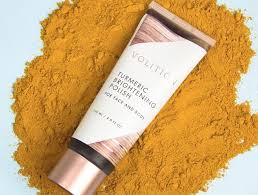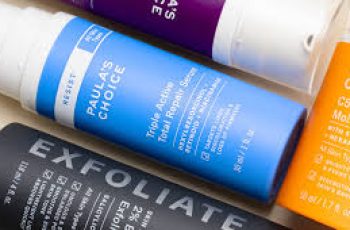
Turmeric in Skin Care Products
Turmeric (Curcuma Longa) is a root commonly harvested for its powdered form to be used in various foods and holistic medicines. It is native to the indian subcontinent and can now be found across south asia. Because of its potent smell and thick color, turmeric is not often used unprocessed in skin care products. Turmeric has demonstrated notable anti-inflammatory, antioxidant, and antimicrobial properties that make is a solid candidate for many kinds of skin care treatments. Traditionally, this ingredient has also been used to increase the rate of wound healing and to treat burns. This ingredient poses no threats to skin health unless you have an allergy to it. Find out if turmeric is right for your skin type!
What is Turmeric?
Turmeric (Curcuma Longa) is a root from south asia that is most often ground and dried to be used as a spice in food or an additive in holistic medicines. In skin care, this ingredient can be found in many product types such as anti-inflammatory moisturizers, acne targeting cleansers, and even various antioxidant focused products for treating sun damage. This ingredient has an extremely yellow tint that often remains visible in products. usually, just the extract curcumin is used as it is the most studied compound for effectiveness within the plant. Turmeric is one of the most well studied spices in skin care, and has many traditional uses in skin care and holistic medicine.
How does Turmeric work?
Most research today suggests that the primary cause for turmeric’s skin care benefits are its active compound curcumin. Curcumin has demonstrated significant anti-inflammatory, antioxidant, and antimicrobial properties in studies (3).
Curcumin is a fat soluble compound, meaning it is able to break down and impart effects in oily environments such as the faces of oily skin types. (4)
The anti-inflammatory capabilities of turmeric are often attributed to curcumin specifically.
Studies have found that curcumin is able to interfere with the effectiveness of transforming growth factor beta (TGF-B) which can result in faster wound healing, and could theoretically slow down the development of cancer cells. (5,6)
Both turmeric and curcumin have been shown to express anti-parasitic, anti-bacterial, and even anti-HIV properties in studies. (7)
In research, curcumin has demonstrated anti-inflammatory effects greater than ibuprofen, and has potent antioxidant effects as well. (8)
Some other active compounds are present in this ingredient such as curcumin 2, curcumin 3, and curcumin 4; of all the active compounds, curcumin 1, or simply “curcumin” is the most studied. (9)
All of this research suggests that turmeric is an extremely valuable ingredient in skin care with limited associated risks outside of allergies.
Take our quiz to find out if turmeric is right for your skin type!
Is turmeric good for the skin?
Turmeric is good for most skin types because it soothes inflammation, kills acne causing bacteria, and eliminates free radicals that can cause lasting genetic damage to the skin. Some studies have also found that turmeric application can help in the synthesis of collagen, an essential structural component of the skin. (10)
This ingredient is safe for oily skin types because it is non-comedogenic, meaning it does not cause clogged pores, and it also lessens the risk of acne.
Dry skin types are also able to safely use turmeric because it does not strip sebum from the skin, nor does it limit sebum production.
Curcumin has been found to effectively bind free radicals which can lead to wrinkles and other kinds of permanent damage on the skin. (15)
Some studies even suggest that turmeric has a lightening effect on the skin making it a good candidate for hyperpigmentation treatments. (11)
Overall, turmeric is a versatile and useful ingredient in cosmetic skin care formulations that is safe and helpful for most skin types.
Is it safe?
Turmeric has been found safe by many independent research organizations for use in skin care products. (12)
Specifically, the Environmental Working Group (EWG) grade turmeric as extremely safe with no found risks.
If you are looking for an all in one ingredient for anti-inflammatory, antioxidant, antimicrobial, and hyperpigmentation treatments, know that turmeric is a studied safe candidate.
Side effects
There are currently no studies that suggest significant adverse effects following the use of turmeric in skin care. (13, 14)
The only realistic risk associated with turmeric use in topical skin care is an allergy, which is considered extremely uncommon for this ingredient. (14)
The only consideration that keeps turmeric outside of common use in skin care is its yellow color and strong smell which could be considered unappealing for certain circumstances.
Turmeric for acne
Ingredients like turmeric with antimicrobial properties are great choices for the treatment and prevention of acne. (17)
Acne is typically caused by a combination of clogged pores and the growth of relevant bacteria on the face. Since turmeric is able to soothe inflammation, pores are less likely to become clogged, additionally, killing bacteria on the skin makes them less likely to develop enough to cause acne.
Like many of the best acne prevention ingredients, turmeric does not itself clog pores and does not add oils to the skin.
If you are struggling with or are typically prone to acne, turmeric/curcumin products could be a great addition to your personal skin care regimen.
For Inflammation
Studies have found that turmeric interferes with inflammation through multiple mechanisms of action, including the inhibition of leukotriene formation. (16)
Turmeric has been found to have more potent anti-inflammatory properties than even ibuprofen. (8)
Inflammation can result in various kinds of discomfort on the skin including redness, itchiness, swelling, and the clogging of pores.
If your skin is sensitive and prone to inflammation, turmeric can be an excellent choice as an ingredient in your skin care products.
turmeric for sun damage
For Sun Damage
Turmeric is a great choice for treating sun damage in many instances because it is an effective antioxidant due its high presence of curcumin. (15) Sun damage can take different forms that can be seen in the peeling of burned skin, redness of burned skin, or an increased presence of wrinkles on the face.
It has been found in some studies that turmeric as a pigment in clothing is extremely good at blocking UV radiation. (19)
In topical uses, antioxidants like turmeric are able to bind the free radicals caused by radiation like UVB which stops them from causing genetic damage. Genetic damage from free radicals has a chance of causing various cancers.
For that reason, using an antioxidant like curcumin or vitamin C, Vitamin E, Coenzyme Q10, Resveratrol, etc. For a comprehensive list of antioxidant ingredients in skin care, check out our dictionary on the topic.
For Hyperpigmentation
Studies have found that turmeric is an effective ingredient for the treatment of hyperpigmentation conditions such as melasma. (18)
Curcumin has been identified as the most significant compound in turmeric as an effective tyrosinase inhibitor in studies. (19)
It is important to note that turmeric on its own does not adequately treat hyperpigmentation, but when used in formulations designed to treat hyperpigmentation alongside multiple other ingredients, it has demonstrated effectiveness.
Best Products with Turmeric
Here are a few dermatologist recommended products with turmeric or curcumin as an ingredient:
To find the best products for your skin type, take the quiz!
We will help you build an entire custom skin care routine.


